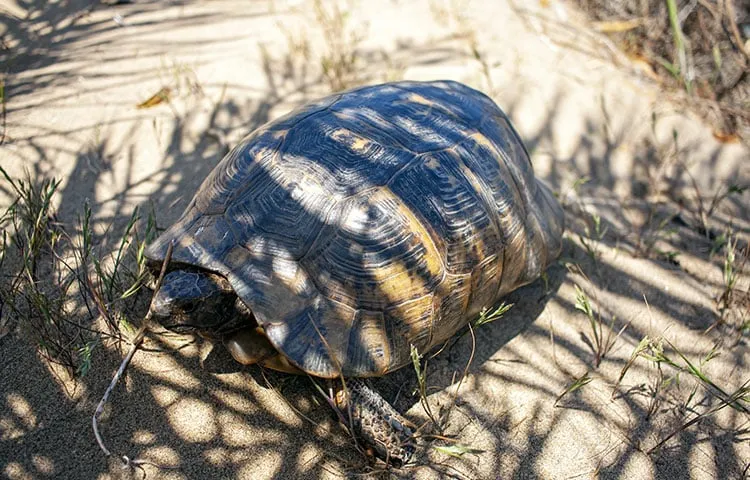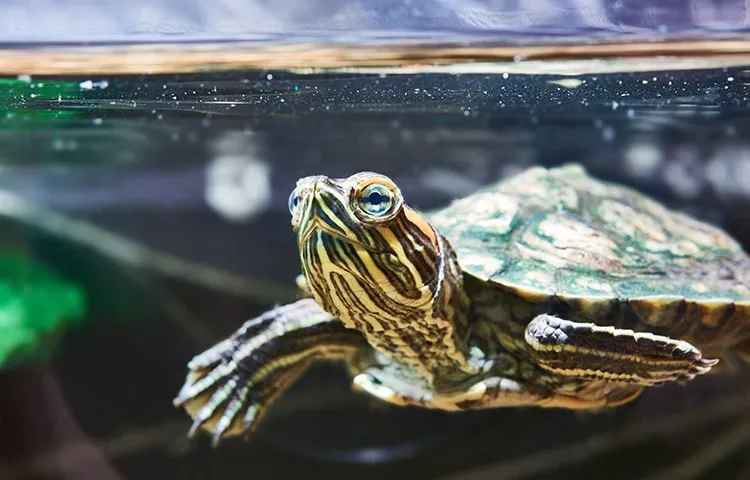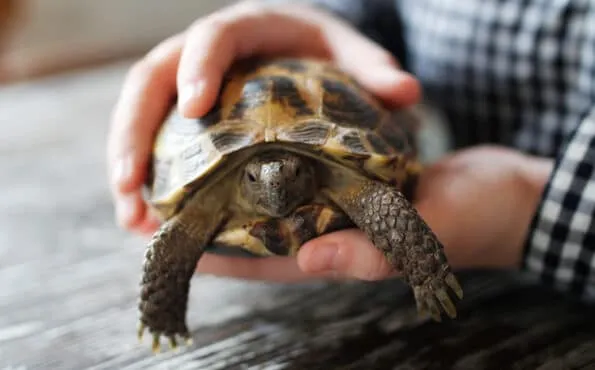Summer can be tough on tortoises, even though they love soaking up the sun. If you’re the proud owner of a Hermann’s, Horsfield, or Marginated tortoise, you might be wondering how to keep your little buddy cool, healthy, and happy as the temperature climbs.
This guide has you covered with tips on tortoise care in hot weather, including how to spot overheating and what to do if things get too hot for comfort.
Can tortoises get too hot?
Yep, tortoises can absolutely overheat. While they love warm weather and need sunlight to stay healthy, too much heat can become dangerous. Tortoises are cold-blooded, meaning they rely on their surroundings to regulate their body temperature. If they can’t find shade or water in extreme heat, they’re at risk of heat stress or overheating (also called hyperthermia).
Even species from warmer climates, like Hermann’s or Horsfield tortoises, can struggle when things get too hot. Without a way to cool down, prolonged exposure to high temperatures can lead to serious health issues.

How hot is too hot for a tortoise?
The ideal temperature range depends on the species, but as a rule of thumb, the basking area should be around 30-32°C, with cooler spots in the 20-25°C range so your tortoise can move between them. This is how tortoises regulate their body temperature.
If outdoor temperatures go above 32°C and there’s no shade or water available, your tortoise could overheat. Heatwaves, especially in the UK, can catch owners off guard, so always provide shady areas and water during summer days.
Be careful if you keep your tortoise in a vivarium or greenhouse, as they can quickly overheat on sunny days. Always use a thermometer to check the temperature and make sure there’s good ventilation.
How can you tell if your tortoise is overheating?
It’s important to keep an eye on your tortoise during the hottest parts of the day. Watch for these signs of overheating:
- Lethargy – They might seem extra tired or just sit around more than usual.
- Open-mouth breathing – This can signal extreme discomfort, especially if it’s paired with wheezing sounds.
- Stretching out – Tortoises will sometimes stretch their neck or limbs to try and cool down.
- Loss of appetite – Not interested in food? It could be heat stress.
- Odd behavior – Things like erratic movements or staying in one spot for too long can also be a clue.
If you notice any of these signs, help your tortoise cool down. Move them to a shady spot, mist their enclosure with water, and make sure they have access to fresh drinking water.
What happens if your tortoise overheats?
If your tortoise gets too hot, they can develop heat stress, which is harmful and can even become life-threatening. Without help, overheating can lead to dehydration, organ failure, or worse.
The first signs might be open-mouth breathing, lethargy, or strange behavior. If not addressed, these could escalate into serious health problems, even collapse.
If you notice your tortoise overheating, move them to a cool, shaded area and mist them with water to help lower their body temperature. Avoid putting them in cold water, as it can shock their system. If symptoms don’t improve, contact your reptile-savvy vet right away.

Keep your tortoise cool and happy
In the wild, tortoises escape extreme heat by seeking shade, burrowing into the ground, or retreating to natural shelters. To keep your tortoise safe and happy, it’s important to mimic these conditions as closely as possible.
Here are some easy and effective ways to make sure your tortoise stays comfortable during hot weather:
- Provide plenty of shady spots in your tortoise’s outdoor enclosure using plants, parasols, or even a large towel or blanket.
- Hides and burrows are perfect for giving your tortoise a cozy place to escape the sun.
- Include a deep layer of substrate (6-12 inches) so your tortoise can burrow and cool down.
- Always have fresh water available for drinking and soaking – something shallow works best.
- Mist shaded areas or the substrate to help cool things down, but don’t overdo it.
- Keep an eye on the enclosure’s temperature with a thermometer and avoid direct sunlight during the hottest parts of the day.
Protect your tortoise with insurance
Even with the best care, unexpected health problems can happen, especially in extreme weather. Tortoises are exotic pets, and vet bills can add up quickly.
That’s where ExoticDirect comes in. We offer tortoise insurance to help cover medical costs should they fall ill or have an accident.
Get a quick quote online today and make sure your tortoise stays happy and healthy all year round. With the right protection, you can enjoy summer worry-free!

